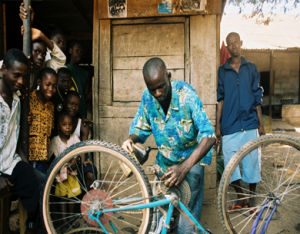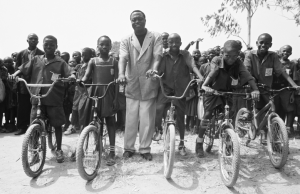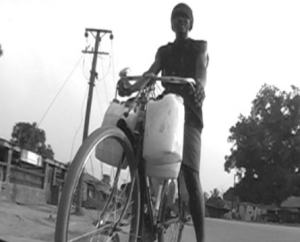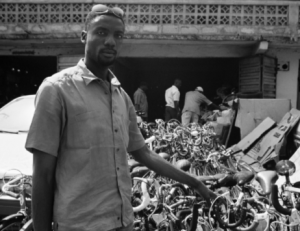by Greg Sucharew
Spring 2009 InGear
My family has been involved with Pedals for Progress in one capacity or another for over a decade now. My father serves as a member of the board. My brother worked for the organization in the 1990s. I began with Pedals in 2002. And I’m sure during this span of time we’ve donated a bike or two. So the idea of bicycles reducing poverty in the underdeveloped world is not new to me. I’ve heard the stories, seen the photographs, read all about the programs, I know how valuable a bike can be to a person in need. And this winter I got the opportunity to see the benefits these bikes produce with my own eyes.
Last year Pedals for Progress began a partnership with a homegrown nongovernmental organization in Kenema, Sierra Leone, called the Center for Research Training and Program Development (CRTPD). They provide their community with a women’s health clinic, a school for the blind, youth centers, and in general try to promote better health and well-being within and around Kenema. The bikes they get from Pedals for Progress help them multiply the aid—sales of the bikes fund their other efforts, and of course, bikes help those who receive them, as well as the shops that are established to service the bikes. The economic stimulation is widespread.
In early January 2009, Pedals for Progress sent me to Sierra Leone to work with our partner there and to get footage for a film I’m making about the project. Needless to say, I was very excited—this was my first trip to Africa.
I traveled from the U.S. with Shed Jah, who is originally from Sierra Leone, and who is chairman of the CRTPD board. We left Newark, New Jersey, for London, and from London flew on to Freetown, Sierra Leone, where we were met by three of Shed’s colleagues from CRTPD, and where I encountered a crowded, dusty, trash-strewn city of mostly unpaved red-dirt streets and poorly-built shacks. A far cry from the stately London I had left only eight hours earlier.
A few days before Shed and I arrived in Freetown, a container of P4P bikes had been cleared by customs, unloaded and temporarily stored away. It remained for our contacts from CRTPD to find a way to get the bikes transported another 250 miles to Kenema, where CRTPD is located. They needed to find a driver, with a truck, willing to navigate the dangerously rough network of roads. It took three days, during which time Shed showed me around Freetown, but they finally negotiated a price and got their driver.

The roads to Kenema from Freetown are nothing like roads in the U.S. Even where there’s pavement, it’s not always much smoother than the rugged reddish-orange dirt roads we mostly traveled on, which during this time of year, dry, windy, hot, meant a thick hazy cloud trailing every vehicle, leaving a fine layer of dust on everything. It took the truck over 12 hours to reach Kenema. I arrived with Shed a few hours earlier in the borrowed United Nations car we traveled in. Along the way, our driver occasionally pulled over in one of the villages lining the torn road, and seeing me, an obvious foreigner in the passenger seat, all the young children would run up to the car trying to sell fruit, soda, or bread. I was surrounded and overwhelmed, but I remember vividly one young girl among them. She was maybe eleven or twelve and kept motioning like she was putting food in her mouth, yet her hand was empty, and you could see in her face, so was her stomach. For the first time in my life I witnessed abject poverty. It was distressing.
When the truck finally arrived in Kenema at the CRTPD facility, a crowd was already waiting. They were there to help unload, and also to get first choice on the bicycles. A staffer kept count and a careful eye on the bikes as they were unloaded, sorted and stacked inside their facility. CRTPD still had to decide on prices, so distribution was delayed. The disappointed would-be customers attached notes, or tied shreds of plastic bags to frames, marking the ones they wanted to purchase.

Over the following days, I wanted to see how bikes were used in Kenema, and whether many people had them. So I went in search of bikes and discovered a burgeoning bicycle culture. I saw bicycles for rent, along with several bike shops and bike mechanics in town whose enterprises supported their own families, and provided employment for others as well. I visited the bike retailers who sold their products along the main road in and out of Kenema. I spoke with a number of students who used to spend hours walking to school and who were now able to ride bicycles. One young man told me he used to walk for six hours to get to school and back. Bikes definitely had a significant and growing presence in Kenema.

One particular group of men I met, who make their living with the help of their bicycles, were the local palm-wine tappers. A tapper wakes at the crack of dawn and rides for miles, heading outside the main city and deep into the bush, where he scales palm trees all day collecting sap, which is fermented into an alcoholic beverage called poyo. This is dangerous work, and tappers often suffer injuries falling from trees. Once they collect the sap, the large containers they use are roped to their bikes and they begin the long trek back to the city where their clients await. I have seen as many as twelve massive bottles hanging on a bike as its rider slowly pedaled by. This is much less burdensome than carrying them without a bike; plus, a tapper can use his bike to transport a much larger load in the first place.
During my stay, I got to see the other things our partner does, much of which is now helped with revenue from CRTPD’s bicycle program and the bikes P4P sends them. They provide critical support for local groups engaged in sustainable revenue-generating activities. They also help fund women’s and youth groups, and agricultural projects, like the ones I visited in the nearby village of Kpai, where rice swamps and cassava fields were being harvested.

Among their operations is the Vocational Training Center for the Blind, a facility where the visually impaired are housed, taught Braille (using old United Nations reports for lack of proper textbooks) and craft woven products such as baskets and mats. There is also a women’s group that, among other things, teaches orphans and runs a local daycare center. There is a vocational center where trades such as cosmetology, tailoring, electronic repair, and mechanics are taught. And CRTPD is even able to provide scholarships for some students who would otherwise be unable to attend.
The bicycles CRTPD receives play a large role in these programs and ventures. People in Kenema clearly need basic transportation, and the bikes from Pedals for Progress provide exactly that. When CRTPD receives P4P bikes, they are sold at a nominal price so the poorest people in town can afford them. The revenue from these sales offsets the shipping costs of the next shipment, as well as funds CRTPD’s other operations, such as the vocational training center and women’s group—all vital works in Kenema. And once distributed, the bikes then stimulate the local economy.
Pedals for Progress sent me to meet our partner in Sierra Leone and film their operation. For me, seeing all this work with my own eyes, for the three weeks I was there, was truly inspiring. I hope my film captures that.
